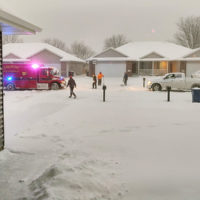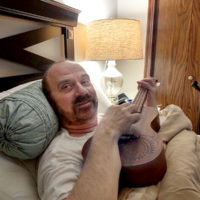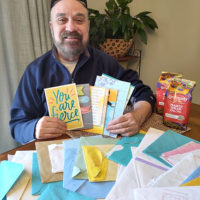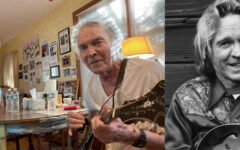
“It’s been tough for all of us entertainers,” began Billy Troy, son of famed reso-guitarist, Josh Graves.
The past year was especially difficult for this professional singer/musician in particular. He nearly died after contracting COVID-19.
In 2007, Troy had left his Nashville home with his wife and youngest son and headed west, relocating in Omaha, Nebraska, to become the entertainment director for a casino.
“It was too good an offer to turn down. It got me off the road. I had been performing 275 days a year. I thought we’d only be there a few years.”
The Graves family (Troy uses his middle name on stage) still reside there in our nation’s heartland.
“As I worked for the casino, I also developed my own show about my life with my dad, and growing up on the Grand Ole Opry, that I was performing in and around the Omaha area. From those shows, I was asked if I’d like to join a non-profit organization called The Merrymakers Association, and I also began performing for several types of retirement communities for senior citizens. It’s been one of the most rewarding experiences of my career. I was doing two shows per day for over 120 senior centers.”
His hour-long shows were a huge success.
“I was told what a difference it made in their lives.”
Then the pandemic hit.
“The shows as well as the centers all went on lock down. There was no work. My wife, Sheryl said, ‘Why don’t you do videos for the seniors?'”
So that is what the 67-year-old did. He started making music videos for the groups he had been performing for live. He created Billy Troy’s In-House Sessions, posting 45 episodes on Facebook.
“Reaction has been great,” the father of five happily shared.
Even during a worldwide pandemic, things were going well for Troy and his family.
“When COVID came, we were very careful. We didn’t go anywhere. We had our groceries delivered, dropped off at the garage. We picked them up with gloves and wiped them down with a bleach solution my wife made. We didn’t eat out. Sheryl cooked the entire time. My wife is very germ-conscious.”
Then they unknowingly were exposed to the coronavirus.
“Our grandbabies that live with us were dropped off by their mother on a Saturday. She called on Tuesday and said that she had tested positive for the virus. She is a health care worker.”
On January 15, the entire Graves household (Troy, his wife, son, and two grandchildren) all came down with COVID-19.
“We all had it, but mine was the worst.”
Troy described what happened next.
“I did a virtual call with my doctor. I was told to stay put, treat the symptoms with over-the-counter meds, and go to the hospital if necessary.
Seven days later I got worse. I was struggling to breathe. I made a mistake and thought I’m a guy, I can handle this.”
Troy almost died at home.
“After three days, my wife said, ‘I’m calling 911. Your face is turning blue.’ I wasn’t really with it. I barely remember them taking me to the hospital.”
It was during the biggest snow storm of the year in Nebraska.
“The ambulance got stuck in our driveway. Neighbors came and helped shovel it out. It was a terrible night.”
Troy’s condition worsened and he was transferred from his local hospital to Methodist Hospital in Omaha.
“The first week there they called my wife and told her to prepare herself and the family because I had taken a turn for the worse. They didn’t think I was going to make it. She couldn’t be there. No one was there to be an advocate for you. I saw terrible things.
I didn’t want to go on a ventilator. I knew I wouldn’t recover. I told the doctor, ‘I don’t want this. I won’t make it.’ They put a DNR (a do-not-resuscitate order) bracelet on me. I feel I survived because of that. It was a lot to go through. It was bad.”
Fans, friends, and family reached out anyway that they could.
“I had so much support. Cards and letters came from all over the country. Their prayers lifted me up. It meant so much. It touched me.”
After almost two weeks in the hospital, his wife negotiated with the medical staff to bring her husband home.
“She took every step to get me well. Handing me a ukulele and encouraging me to exercise my lungs by singing just a little. I started getting stronger. After a few weeks, I wanted to see if I could really still sing.”
Earning his living as a vocalist, it was crucial that he hadn’t lost his God-given talent to Covid. “I had no problems,” he thankfully admitted.
His first project after contracting the virus was a collaborative music video with his longtime North Carolina banjo-pickin’ buddy, Hugh Moore, Sea of Heartbreak.
He started performing again, but found he lacked the stamina.
“I made it through May fairly well. In June, I did a theater in South Dakota along with six other shows that same week. Then started feeling weak. I thought I had COVID again. I cancelled the whole last week of June. I was fine, just trying too hard, too soon.”
Now he’s back in front of the microphone entertaining seniors and performing his regular venues, but limiting his performances to 5-6 shows per week. Troy continues to experience some side effects from his bout with COVID, but thankfully, his singing voice isn’t one of them.
“It was quite the ordeal. I had COVID pneumonia. My lungs were full of it. I still have trouble with strength and stamina. Another residual effect is throughout the day I smell gasoline when it’s not there. It’s got to do with the smell sensory nerves.
It was close to two months before I started performing again. I think it’s because I’m a singer that I was able to survive this. I have strong lungs. I think that saved me.”
Reflecting on his life-threatening illness, Troy stressed his concern for others.
“People should take this disease seriously. My advice is if you feel sick, get it checked out. Go to the doctor and get treated. Men, listen to your wife!”
The whole horrible ordeal has been life-changing for the singer.
“I have a different perspective. You just want to hug everybody,” Troy concluded.










